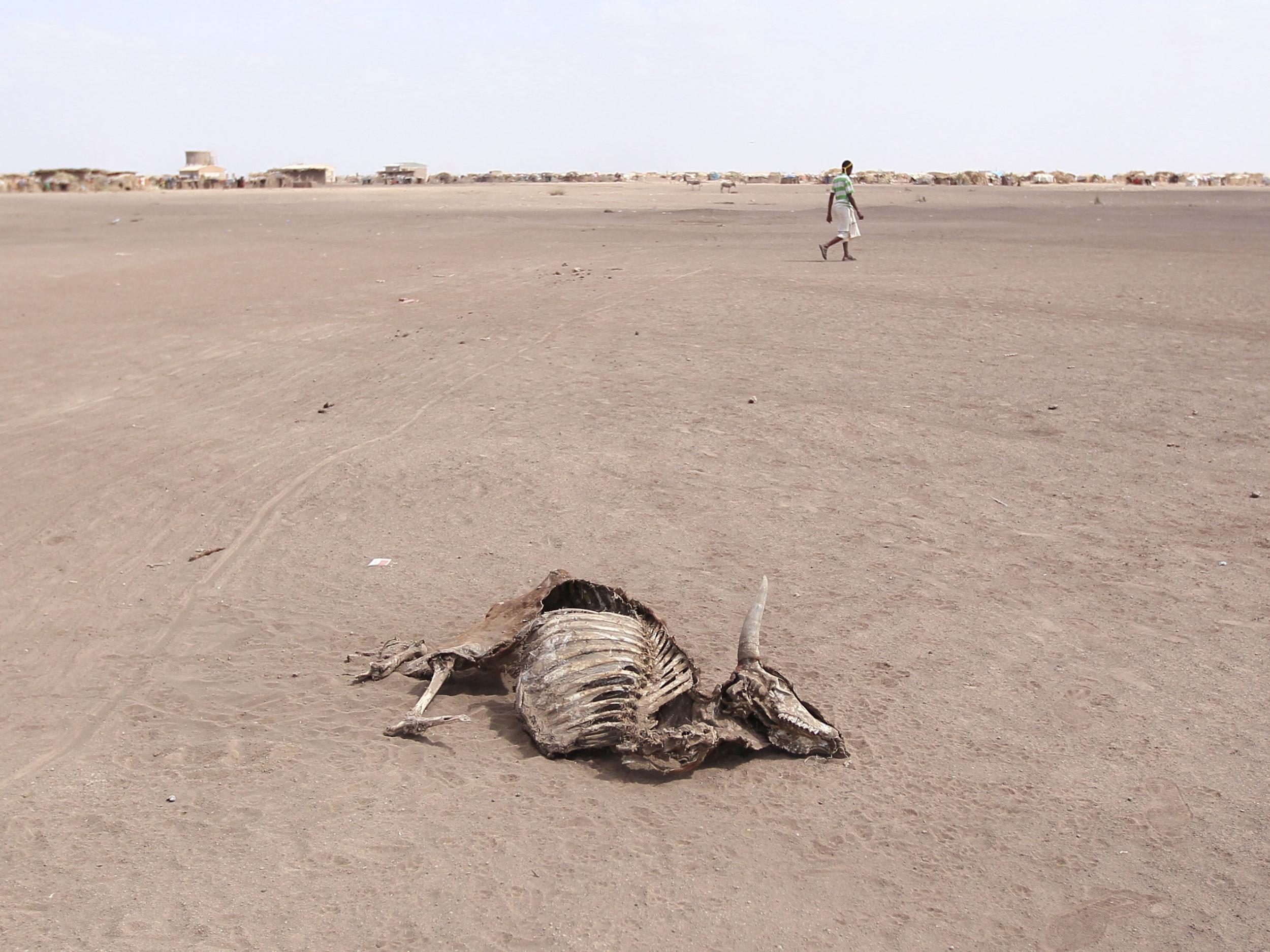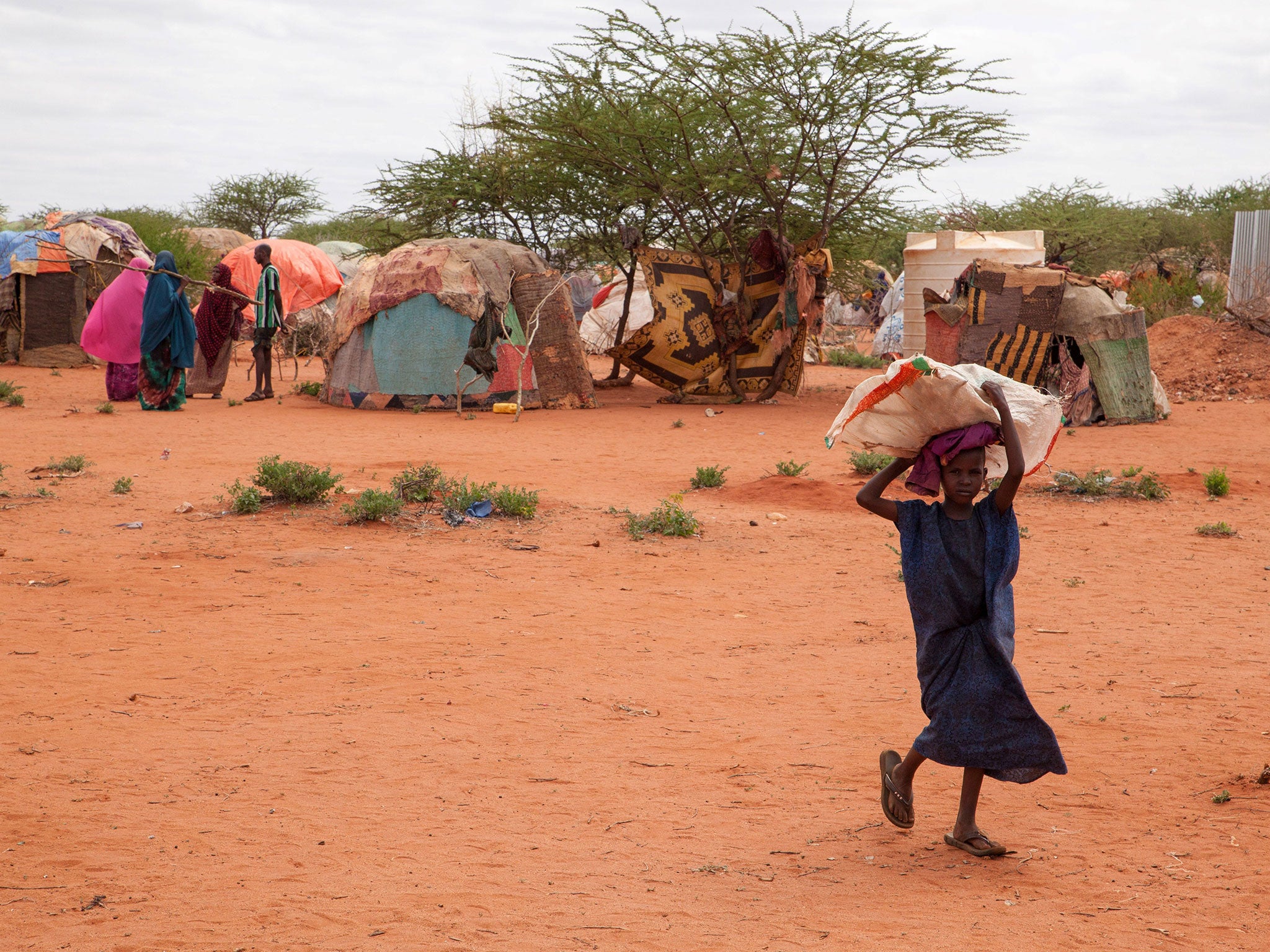Ethiopia drought: Millions of people urgently in need of food aid after string of natural disasters
The UK's International Development Secretary, Priti Patel, urges the world to do more to help people 'at risk of starving to death as extreme hunger stalks East Africa'

Your support helps us to tell the story
From reproductive rights to climate change to Big Tech, The Independent is on the ground when the story is developing. Whether it's investigating the financials of Elon Musk's pro-Trump PAC or producing our latest documentary, 'The A Word', which shines a light on the American women fighting for reproductive rights, we know how important it is to parse out the facts from the messaging.
At such a critical moment in US history, we need reporters on the ground. Your donation allows us to keep sending journalists to speak to both sides of the story.
The Independent is trusted by Americans across the entire political spectrum. And unlike many other quality news outlets, we choose not to lock Americans out of our reporting and analysis with paywalls. We believe quality journalism should be available to everyone, paid for by those who can afford it.
Your support makes all the difference.Millions of people in Ethiopia require “immediate life-saving intervention” after a severe drought and major flash floods have devastated livestock and crops, the United Nations has warned.
At least 7.8 million people have been receiving emergency food aid since April, up from 5.6 million at the start of the year, but a further 700,000 people in the country’s Somali region did not receive supplies “due to resource constraints” and they are now feared to be on the brink of starvation.
In July, there were 376,000 severely malnourished children under five and 3.6 million moderately malnourished children and women who were either pregnant or breastfeeding a child.
Oxfam warned that the international community – currently preoccupied with other issues such as Isis, Donald Trump and North Korea – must act urgently to prevent the crisis from turning into a “catastrophe”.
In a report, written with the Ethiopian government, the UN’s Office for the Coordination of Humanitarian Affairs (OCHA) warned of “deepening levels of malnutrition and critical water shortages in the drought-affected areas”.
Some 228 districts, more than half the country, are now classed as “hotspot priority one” areas where people will die without help.
“The number of districts requiring immediate life-saving intervention increased to levels not seen since the height of the El Niño drought impacts in 2016,” the report said, referring to the natural weather system that increased the world’s average temperature last year, exacerbating the situation in Ethiopia.
“The 19 per cent increase in priority one districts is largely due to the deepening drought conditions, which continue to deplete water and pasture sources, significantly impacting livestock body condition and milk production.

“Milk is the main source of food and income for the majority of households in the drought-affected areas.”
About two million animals have died in the Somali region alone, according to the UN’s Food and Agriculture Organisation (FAO).
But, as some areas suffer from drought, others are experiencing severe flooding.
“In Oromia region, four incidents of flash floods were reported in Adama, Arsi and East Shewa zones in the second week of July, destroying more than 50 houses and more than 800 hectares of fruit and vegetable crops,” the report said.
“In Afar region, a flooding incident on 20 July has affected 204 households and damaged one school and health centre in Megale [district].”
The report warned a total of more than 1.5 million people were expected to be affected by flooding this summer with 500,000 likely to be forced to leave their homes.
There is also an ongoing outbreak of acute watery diarrhoea in six regions.
So far the international community has committed $382m towards an appeal for $948m of aid sought in January this year.
“All humanitarian partners, including donors and recipient agencies, are encouraged to inform OCHA Ethiopia of cash and in-kind contributions,” the report said.
Abdoul Karim Bah, the FAO’s deputy representative in Ethiopia, told the Thomson Reuters Foundation that it was “crucial” to provide aid between now and October when the rains are due to come.
“If we don’t act now, hunger and malnutrition will only get worse among (herding) communities,” he said.
And Manish Kumar, Oxfam’s humanitarian programme manager in Ethiopia, told The Independent in a statement that “yet another poor rainy season has pushed 700,000 more people to the verge of starvation in southern Ethiopia”.
“A deadly mix of severe malnutrition coupled with acute watery diarrhoea puts thousands of lives at risk, particularly the elderly and children,” he said.
“People will have to wait until the next rains in October for any reprieve. Urgent action is needed to prevent this crisis from turning into a catastrophe.”
Mr Kumar said the Ethiopian government was taking action to address the situation, but added that “the scale of suffering is overwhelming and rising”.
“Of the $1.25bn needed to provide emergency aid, less than 40 per cent has been donated,” he said.
“The international community needs to step up its efforts so that people can get the help they urgently need now.”
The UK has provided £30m to pay for food for 1.5 million people in the worst-affected areas. Last year, the UK funded emergency food for three million people. It is also trying to help Ethiopia improve its long-term resilience to drought as the climate changes.
Priti Patel, the UK’s International Development Secretary, who visited the country last month, told The Independent in a statement that British taxpayers had “led the way in providing a lifeline for millions of people, including in Ethiopia, who are at risk of starving to death as extreme hunger stalks East Africa”.
“However, while Britain leads, others must follow and I have lobbied the UN, other donor countries and the government of Ethiopia to act now and put funds into this emergency situation,” she said.
“We are showing our continued leadership by saving lives, providing food, water and medicine for those at imminent risk of dying from drought and conflict. Others who are funded by the UK, such as the UN, should do more.
“It is in all our interests to act in order to secure stability, peace, security and prosperity in this part of Africa.”
Join our commenting forum
Join thought-provoking conversations, follow other Independent readers and see their replies
Comments